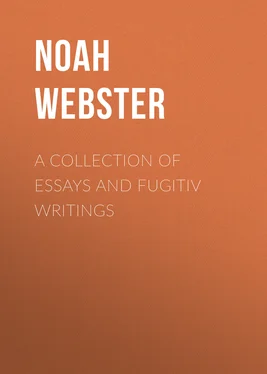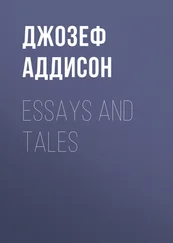Noah Webster - A Collection of Essays and Fugitiv Writings
Здесь есть возможность читать онлайн «Noah Webster - A Collection of Essays and Fugitiv Writings» — ознакомительный отрывок электронной книги совершенно бесплатно, а после прочтения отрывка купить полную версию. В некоторых случаях можно слушать аудио, скачать через торрент в формате fb2 и присутствует краткое содержание. Жанр: foreign_prose, foreign_antique, на английском языке. Описание произведения, (предисловие) а так же отзывы посетителей доступны на портале библиотеки ЛибКат.
- Название:A Collection of Essays and Fugitiv Writings
- Автор:
- Жанр:
- Год:неизвестен
- ISBN:нет данных
- Рейтинг книги:5 / 5. Голосов: 1
-
Избранное:Добавить в избранное
- Отзывы:
-
Ваша оценка:
- 100
- 1
- 2
- 3
- 4
- 5
A Collection of Essays and Fugitiv Writings: краткое содержание, описание и аннотация
Предлагаем к чтению аннотацию, описание, краткое содержание или предисловие (зависит от того, что написал сам автор книги «A Collection of Essays and Fugitiv Writings»). Если вы не нашли необходимую информацию о книге — напишите в комментариях, мы постараемся отыскать её.
A Collection of Essays and Fugitiv Writings — читать онлайн ознакомительный отрывок
Ниже представлен текст книги, разбитый по страницам. Система сохранения места последней прочитанной страницы, позволяет с удобством читать онлайн бесплатно книгу «A Collection of Essays and Fugitiv Writings», без необходимости каждый раз заново искать на чём Вы остановились. Поставьте закладку, и сможете в любой момент перейти на страницу, на которой закончили чтение.
Интервал:
Закладка:
In deliberating upon any plan of instruction, we should be attentive to its future influence and probable advantages. What advantage does a merchant, a mechanic, a farmer, derive from an acquaintance with the Greek and Roman tongues? It is true, the etymology of words cannot be well understood, without a knowlege of the original languages of which ours is composed. But a very accurate knowlege of the meaning of words and of the true construction of sentences, may be obtained by the help of Dictionaries and good English writers; and this is all that is necessary in the common occupations of life. But suppose there is some advantage to be derived from an acquaintance with the dead languages, will this compensate for the loss of five or perhaps seven years of valuable time? Life is short, and every hour should be employed to good purposes. If there are no studies of more consequence to boys, than those of Latin and Greek, let these languages employ their time; for idleness is the bane of youth. But when we have an elegant and copious language of our own, with innumerable writers upon ethics, geography, history, commerce and government; subjects immediately interesting to every man; how can a parent be justified in keeping his son several years over rules of Syntax, which he forgets when he shuts his book; or which, if remembered, can be of little or no use in any branch of business? This absurdity is the subject of common complaint; men see and feel the impropriety of the usual practice; and yet no arguments that have hitherto been used, have been sufficient to change the system; or to place an English school on a footing with a Latin one, in point of reputation.
It is not my wish to discountenance totally the study of the dead languages. On the other hand I should urge a more close attention to them, among young men who are designed for the learned professions. The poets, the orators, the philosophers and the historians of Greece and Rome, furnish the most excellent models of Stile, and the richest treasures of Science. The slight attention given to a few of these authors, in our usual course of Education, is rather calculated to make pedants than scholars; and the time employed in gaining superficial knowlege is really wasted. 2 2 In our colleges and universities, students read some of the ancient Poets and Orators; but the Historians, which are perhaps more valuable, are generally neglected. The student just begins to read Latin and Greek to advantage, then quits the study. Where is the seminary, in which the students read Herodotus, Thucydides, Xenophon, Polybius, Dionysius Halicarnasseus, Livy, Velleius, Paterculus and Tacitus? How superficial must be that learning, which is acquired in four years! Severe experience has taught me the errors and defects of what is called a liberal education. I could not read the best Greek and Roman authors while in college, without neglecting the established classical studies; and after I left college, I found time only to dip into books, that every scholar should be master of; a circumstance that often fills me with the deepest regret. "Quis enim ignorat et eloquentiam et cæteras artes descivisse ab ista vetere gloria, non inopia hominum, sed desidia juventutis, et negligentia parentum, et inscientia præcipientium, et oblivione moris antiqui?—Nec in auctoribus cognoscendis, nec in evolvenda antiquitate, nec in notitia vel rerum, vel hominum, vel temporum satis operæ insumitur."— Tacitus, de Orat. Dial. 28. 29.
"A little learning is a dangerous thing,
Drink deep, or taste not the Pierian spring."
But my meaning is, that the dead languages are not necessary for men of business, merchants, mechanics, planters, &c. nor of utility sufficient to indemnify them for the expense of time and money which is requisite to acquire a tolerable acquaintance with the Greek and Roman authors. Merchants often have occasion for a knowlege of some foreign living language, as, the French, the Italian, the Spanish, or the German; but men, whose business is wholly domestic, have little or no use for any language but their own; much less, for languages known only in books.
There is one very necessary use of the Latin language, which will always prevent it from falling into neglect; which is, that it serves as a common interpreter among the learned of all nations and ages. Epitaphs, inscriptions on monuments and medals, treaties, &c. designed for perpetuity, are written in Latin, which is every where understood by the learned, and being a dead language is liable to no change.
But the high estimation in which the learned languages have been held, has discouraged a due attention to our own. People find themselves able without much study to write and speak the English intelligibly, and thus have been led to think rules of no utility. This opinion has produced various and arbitrary practices, in the use of the language, even among men of the most information and accuracy; and this diversity has produced another opinion, both false and injurious to the language, that there are no rules or principles on which the pronunciation and construction can be settled.
This neglect is so general, that there is scarcely an institution to be found in the country, where the English tongue is taught regularly, from its elements to its true and elegant construction, in prose and verse. Perhaps in most schools, boys are taught the definition of the parts of speech, and a few hard names which they do not understand, and which the teacher seldom attempts to explain; this is called learning grammar . This practice of learning questions and answers without acquiring any ideas, has given rise to a common remark, that grammar is a dry study ; and so is every other study which is prosecuted without improving the head or the heart. The study of geography is equally dry, when the subject is not understood. But when grammar is taught by the help of visible objects; when children perceive that differences of words arise from differences in things, which they may learn at a very early period of life, the study becomes entertaining, as well as improving. In general, when a study of any kind is tiresome to a person, it is a presumptive evidence that he does not make any proficiency in knowlege, and this is almost always the fault of the instructor.
In a few instances perhaps the study of English is thought an object of consequence; but here also there is a great error in the common practice; for the study of English is preceded by several years attention to Latin and Greek. Nay, there are men, who contend that the best way to become acquainted with English, is to learn Latin first. Common sense may justly smile at such an opinion; but experience proves it to be false.
If language is to be taught mechanically, or by rote, it is a matter of little consequence whether the rules are in English, Latin or Greek: But if children are to acquire ideas , it is certainly easier to obtain them in a language which they understand, than in a foreign tongue. The distinctions between the principal parts of speech are founded in nature, and are within the capacity of a school boy. These distinctions should be explained in English, and when well understood, will facilitate the acquisition of other languages. Without some preparation of this kind, boys will often find a foreign language extremely difficult, and sometimes be discouraged. We often see young persons of both sexes, puzzling their heads with French, when they can hardly write two sentences of good English. They plod on for some months with much fatigue, little improvement, and less pleasure, and then relinquish the attempt.
The principles of any science afford pleasure to the student who comprehends them. In order to render the study of language agreeable, the distinctions between words should be illustrated by the differences in visible objects. Examples should be presented to the senses, which are the inlets of all our knowlege. That nouns are the names of things, and that adjectives express their qualities , are abstract definitions, which a boy may repeat five years without comprehending the meaning. But that table is the name of an article, and hard or square is its property, is a distinction obvious to the senses, and consequently within a child's capacity.
Читать дальшеИнтервал:
Закладка:
Похожие книги на «A Collection of Essays and Fugitiv Writings»
Представляем Вашему вниманию похожие книги на «A Collection of Essays and Fugitiv Writings» списком для выбора. Мы отобрали схожую по названию и смыслу литературу в надежде предоставить читателям больше вариантов отыскать новые, интересные, ещё непрочитанные произведения.
Обсуждение, отзывы о книге «A Collection of Essays and Fugitiv Writings» и просто собственные мнения читателей. Оставьте ваши комментарии, напишите, что Вы думаете о произведении, его смысле или главных героях. Укажите что конкретно понравилось, а что нет, и почему Вы так считаете.












